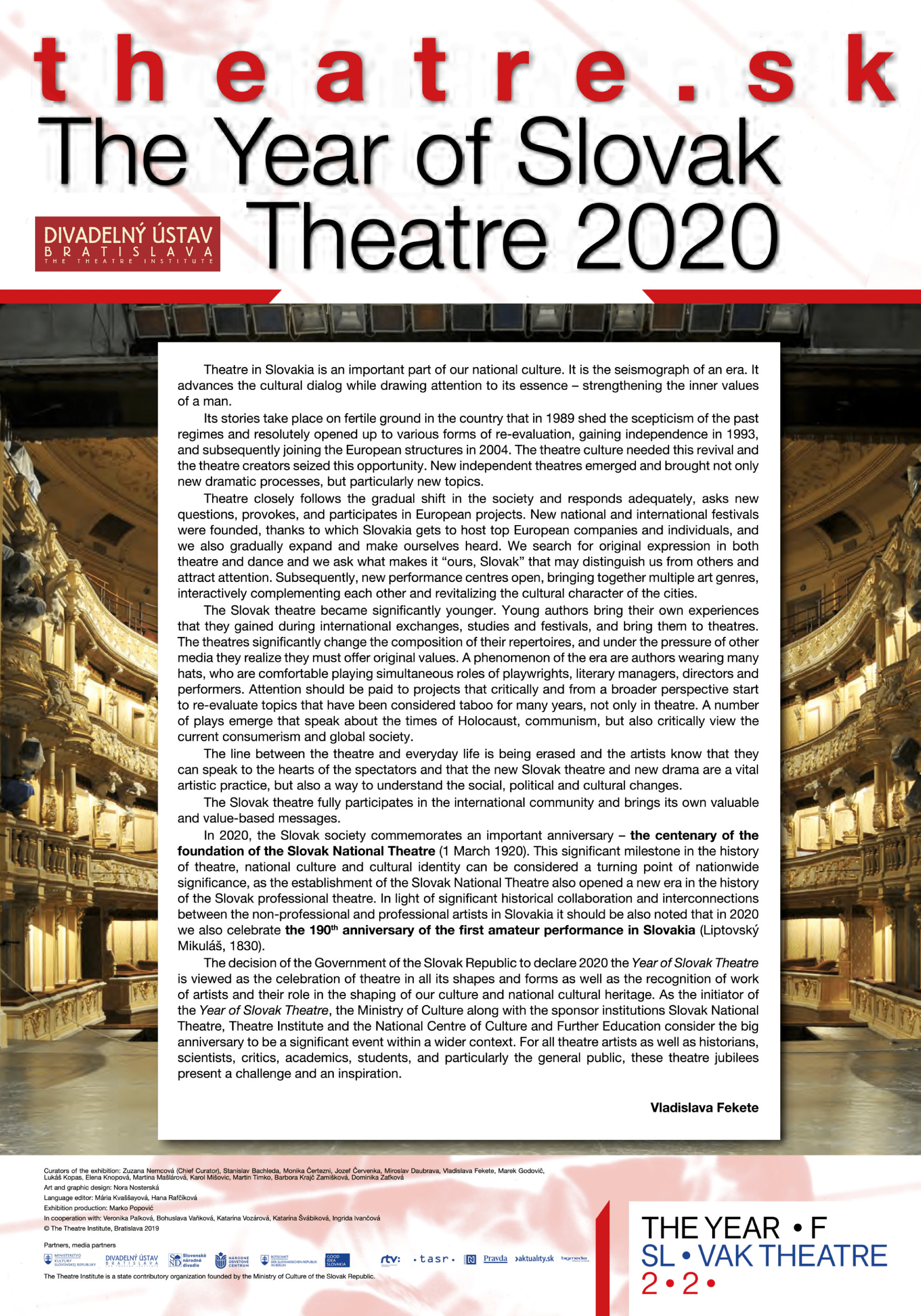
The History of Slovak Theatre – Introduction
Theatre in Slovakia is an important part of our national culture. It is the seismograph of an era. It advances the cultural dialog while drawing attention to its essence – strengthening the inner values of a man.
Its stories take place on fertile ground in the country that in 1989 shed the scepticism of the past regimes and resolutely opened up to various forms of re-evaluation, gaining independence in 1993, and subsequently joining the European structures in 2004. The theatre culture needed this revival and the theatre creators seized this opportunity. New independent theatres emerged and brought not only new dramatic processes, but particularly new topics.
Theatre closely follows the gradual shift in the society and responds adequately, asks new questions, provokes, and participates in European projects. New national and international festivals were founded, thanks to which Slovakia gets to host top European companies and individuals, and we also gradually expand and make ourselves heard. We search for original expression in both theatre and dance and we ask what makes it “ours, Slovak” that may distinguish us from others and attract attention. Subsequently, new performance centres open, bringing together multiple art genres, interactively complementing each other and revitalizing the cultural character of the cities.
The Slovak theatre became significantly younger. Young authors bring their own experiences that they gained during international exchanges, studies and festivals, and bring them to theatres. The theatres significantly change the composition of their repertoires, and under the pressure of other media they realize they must offer original values. A phenomenon of the era are authors wearing many hats, who are comfortable playing simultaneous roles of playwrights, literary managers, directors and performers. Attention should be paid to projects that critically and from a broader perspective start to re-evaluate topics that have been considered taboo for many years, not only in theatre. A number of plays emerge that speak about the times of Holocaust, communism, but also critically view the current consumerism and global society.
The line between the theatre and everyday life is being erased and the artists know that they can speak to the hearts of the spectators and that the new Slovak theatre and new drama are a vital artistic practice, but also a way to understand the social, political and cultural changes.
The Slovak theatre fully participates in the international community and brings its own valuable and value-based messages.
In 2020, the Slovak society commemorates an important anniversary – the centenary of the foundation of the Slovak National Theatre (1 March 1920). This significant milestone in the history of theatre, national culture and cultural identity can be considered a turning point of nationwide significance, as the establishment of the Slovak National Theatre also opened a new era in the history of the Slovak professional theatre. In light of significant historical collaboration and interconnections between the non-professional and professional artists in Slovakia it should be also noted that in 2020
we also celebrate the 190th anniversary of the first amateur performance in Slovakia (Liptovský Mikuláš, 1830).
The decision of the Government of the Slovak Republic to declare 2020 the Year of Slovak Theatre is viewed as the celebration of theatre in all its shapes and forms as well as the recognition of work of artists and their role in the shaping of our culture and national cultural heritage. As the initiator of the Year of Slovak Theatre, the Ministry of Culture along with the sponsor institutions Slovak National Theatre, Theatre Institute and the National Centre of Culture and Further Education consider the big anniversary to be a significant event within a wider context. For all theatre artists as well as historians, scientists, critics, academics, students, and particularly the general public, these theatre jubilees present a challenge and an inspiration.
Vladislava Fekete
This is an online version of exhibition theatre.sk.


